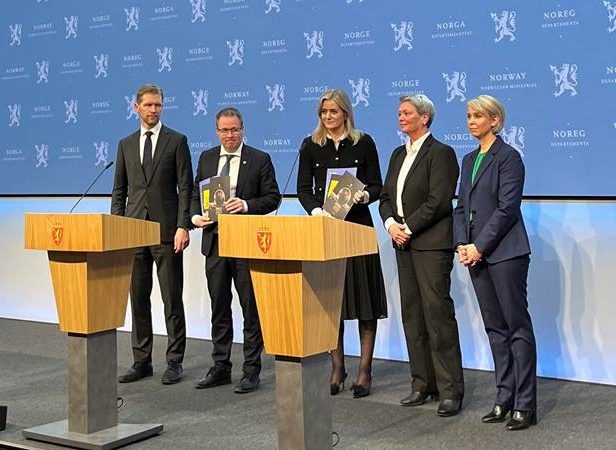Norway’s three national security agencies teamed up this year to present their evaluations of threats to national security, and they all centered on the impact of Russia’s war on Ukraine. Defense Minister Bjørn Arild Gram said their reports “stress that the world is more dangerous and more unpredictable.”

Gram has political responsibility for the defense department’s intelligence agency known as Etterretnings- or E-tjenesten, while Justice Minister Emilie Enger Mehl is responsible for the state police intelligence agency PST and the national security authority NSM. All three presented their evaluations on Monday, jointly for the first time, and Russia’s invasion of Ukraine dominated the agenda.
“The war has changed our daily life,” Gram said. “The situation puts high demands on national cooperation regarding security and preparedness, and that we make the best use of what they’re presenting.” Similar cooperation has characterized international efforts regarding defense, security and preparedness since Russian President Vladimir Putin launched his war on Ukraine, threatening democracy on the entire continent.
Mehl agreed that even though the war is going on “beyond our borders,” it’s had consequences for Norwegian territory, especially since Norway and Russia share a border in the far north. Security has been also been boosted elsewhere around the country and not least in the North Sea, where Norwegian offshore oil and gas installations and pipelines are viewed as potential targets to further disrupt energy supplies to Europe.
The new threat evaluations come just as Russia is widely believed to be launching a new offensive against Ukraine, which has ever-growing support from NATO members including Norway and other countries around the world. While the invasion ordered by Putin has prompted Sweden and Finland to seek NATO membership, E-tjenesten warns it has also increased pressure on Norway. Norway will play a key role in supplying Sweden and Finland with NATO assistance if the need arises, while it also will involve more Norwegian presence in the Baltic area.
The military intelligence service notes, however, that Russia’s war on Ukraine has diverted military personnel and hardware away from the Arctic and Baltic regions. The inclusion of Sweden and Finland in NATO can nonetheless raise tensions “in our area,” Lars Nordrum, intelligence chief at E-tjenesten, told state broadcaster NRK.
Actual terror threats from abroad, he added, mostly come from single individuals and a network of sympathizers among both Islamic- and right-wing extremists. PST chief Beate Gangås sees the biggest threats coming from Russia, though, in the form of espionage. “We have no reason to be less worried than we were a year ago,” Gangås said when she and her fellow security chiefs jointly presented their evaluations. “It will be important to follow methods Russia will use to acquire information,” especially from educational institutions, companies and politicians.
PST has lowered its terror threat level back to “moderate” after raising it right after an Islamic extremist set off a mass shooting in Oslo last June. The wildcard is whether provocative incidents, such as when right-wing extremists burn a copy of the Koran, will provoke more “extreme methods” as a response.
Gram insisted that “we shall be able to sleep well at night,” and therefore it’s “important for the government to strengthen” the intelligence agencies and security itself. NSM continues to call for increased preparedness especially in the area of cyber security and any efforts by “foreign players” to acquire important technology or strategically important companies.
“Unpredictable times demand higher preparedness,” read a title on NSM’s report, called Risiko 2023. “We want Norwegian companies and organizations to increase the tempo of their security work because there will be more threats and they’ll be more sophisticated,” said NSM chief Sofie Nystrøm. “Preparedness must be in place before crises occur.”
All three unclassified versions of the agencies’ threat reports are available on their websites. English versions are expected in early March, with PST’s already available here (external link to PST’s website).
NewsinEnglish.no/Nina Berglund

